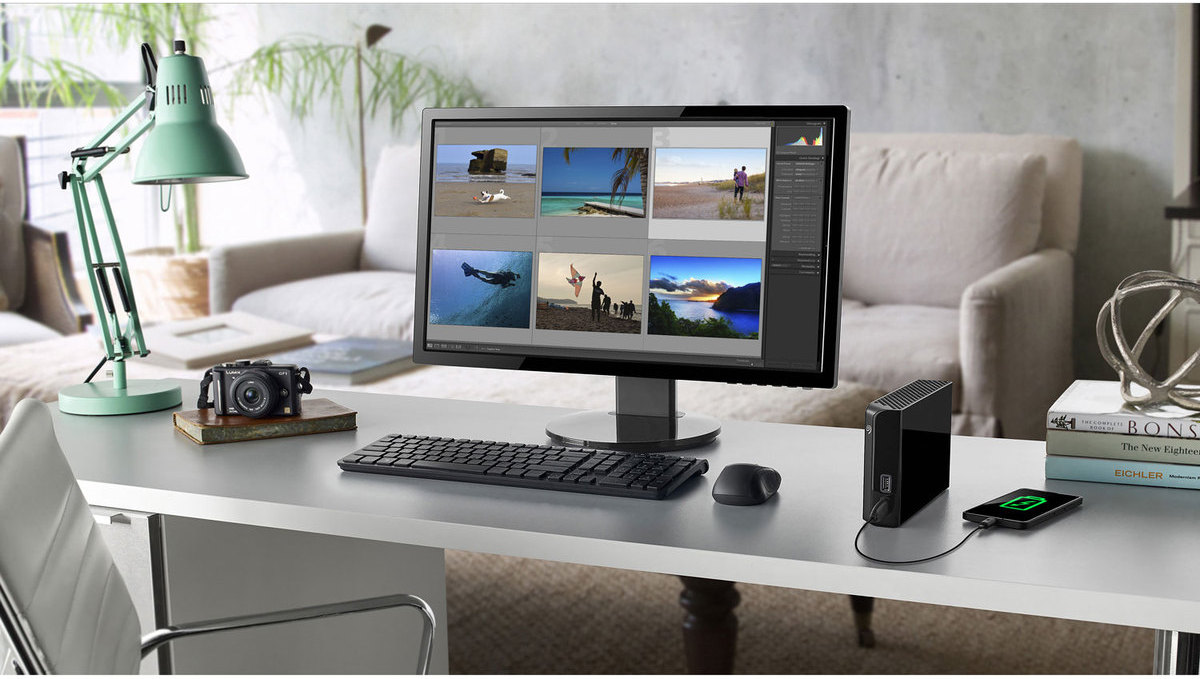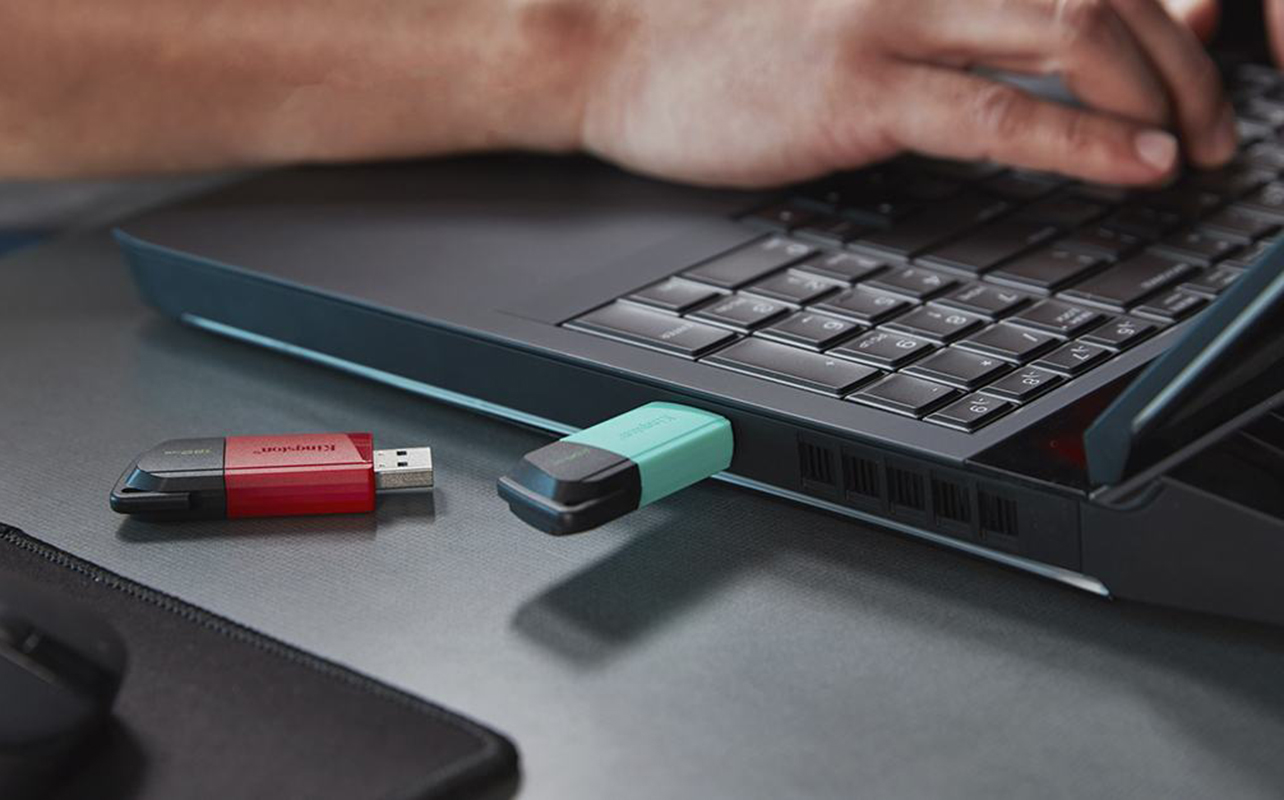
Cloud storage may be readily available everywhere but portable drives still have their place. Whether you’re backing up photos and videos, transferring large work files, or keeping sensitive data offline, external hard drives and flash drives remain reliable choices. Let’s look at how they differ, what each is best suited for, and how to choose the right one for your needs.
What is an external hard drive?
An external hard drive, a popular choice for those seeking extensive data storage, is essentially a regular hard drive (like the one in your computer) housed in a protective casing. These devices connect to your system via USB and offer substantial storage capacities, making them perfect for backing up large amounts of data or transporting big files. When looking for the best external hard drives, consider aspects like storage capacity, speed, and brand reliability.
The underlying technology has also changed over the years. In the past, external hard drives used moving parts inside—kind of like a record player where the stylus touches down on a spinning disk—to access data stored on it. SSD, or solid state drives, have no moving parts inside, which is why they’re both smaller and faster by comparison. You have less of a chance running into a mechanical problem, as a result.
What is a flash drive?
A flash drive—also commonly referred to as a USB stick or thumb drive—is a compact, highly portable storage device that uses SSD flash memory. Its size and ease of use have made it a staple for many, particularly when dealing with a smaller quantity of data. While they may not match external hard drives for capacity, their convenience factor is undeniable. Top flash drives are those offering a balance between size, speed, and durability.

External hard drive vs. flash drive: the key differences
Comparing external hard drives and flash drives isn’t just about size—they differ in design, capacity, speed, and durability.
Design and portability
External hard drives are larger and heavier, especially traditional HDD (hard disk drive) models that use spinning disks. SSD versions, on the other hand, are more compact and rugged thanks to their flash memory construction. Flash drives remain the most portable option—they’re lightweight, pocket-sized, and easy to carry on a keychain.
Storage capacity
Storage capacities have grown across the board. External hard drives now typically range from 2TB to 8TB, while external SSDs can reach up to 4TB–8TB, offering significantly faster performance. Flash drives, though smaller, now commonly offer 256GB to 1TB of storage—handy for transferring or backing up essential files or even entire computers.
Speed and durability
External SSDs outpace both HDDs and flash drives in read/write speeds, especially with USB 3.2 Gen 1/2 or USB-C connections. Plus, without moving parts, they’re also more shock-resistant. HDDs offer better cost per gigabyte, making them ideal for bulk storage, except they’re less durable. Flash drives are convenient for quick transfers yet typically slower and less suited for long-term heavy use.
Ultimately, your choice comes down to how you plan to use it. If you need high-capacity backups, an external HDD is great value; for faster performance and better durability, go with an SSD; and for quick, on-the-go transfers, a flash drive keeps things simple. What works best for you ultimately depends on your specific requirements and usage scenarios.
Reliability: are USB sticks more reliable than external hard drives?
Your data deserves a safe home, whether it’s important work files or your favourite vacation photos. When it comes to reliability, both flash drives and external hard drives can be dependable—depending on how you use them.
Flash drives (USB sticks)
Modern flash drives are small but mighty. With USB 3.2 or USB-C connections, they’re faster and more efficient than ever. They have no moving parts, which makes them more resistant to drops or shocks. However, they’re best suited for occasional transfers, school projects, presentations, or travel, since frequent read/write activity can wear them out faster over time.
External hard drives (HDD and SSD)
Traditional HDDs store massive amounts of data affordably, but their moving parts can make them more vulnerable to physical damage. That’s not an issue with external SSDs that prove far more durable and faster, perfect for content creators, video editors, or anyone handling large files. Many newer models also feature rugged casings for extra protection or hardware encryption for added data security. In basic terms, external SSDs are like larger versions of flash storage thumb drives. That’s why reliability depends less on the storage type itself and more on build quality and how you use it. SSD technology tends to offer a more reliable solution for heavy-duty, long-term storage.

Performance: is flash storage better than a hard drive?
Performance now varies widely based on the model and connection type. It’s virtually a no-contest in speed now that modern USB 3.2 or USB-C flash drives can easily outrun older external HDDs. But when you compare them with external SSDs, flash drives still come up short.
It’s not just that external SSDs offer the faster transfer rates, it’s also the near-instant file access ideal for video editing, creative workflows, or frequent backups. There’s good value in HDDs for high-capacity media storage, despite being slower, only you can’t work directly off the drive as quickly. If you’re editing video or photos, for instance, you could save storage on your computer by running the files directly from a drive. SSDs are inherently better suited for that. Flash drives can do that, too, and are unbeatable for quick file transfers on the go.
So instead of thinking “which is better,” it’s more about what you’re using it for:
External SSD: Fast, reliable, and built for performance.
Flash drive: Portable, quick, and easy for transferring files.
External HDD: Affordable, high-capacity backup solution.
Usability: can you use a USB drive as a hard drive or an external hard drive like a USB?

Technically, you can use a USB flash drive the same way you’d use an external hard drive—but that doesn’t mean it’s ideal for every task.
Think of it this way:
- Student or professional on the go? Use a flash drive to carry your presentation or assignments.
- Travelling photographer or gamer? Use an external SSD to store photos, gameplay footage, or creative projects quickly and safely.
- Home office or entertainment setup? Use an external HDD to back up your computer or store movies, music, and large files long-term.
In many cases, people use both—a flash drive for portability and an external hard drive for everyday backup and storage.
Comparing external hard drives and flash drives at a glance
| Feature | Flash Drive | External HDD | External SSD |
|---|---|---|---|
| Portability | Extremely compact; fits on a keychain | Bulkier but still portable | Slim, lightweight |
| Typical Capacity (2025) | 256GB–1TB | 2TB–8TB | 4TB–8TB |
| Speed | Fast (USB 3.2/USB-C) | Moderate (USB 3.2 Gen 1/2) | Very fast (USB-C/Thunderbolt) |
| Durability | Good; no moving parts | Fair; moving parts vulnerable to drops | Excellent; shock-resistant |
| Best For | Quick transfers, travel, school | Large backups, media libraries | Creative work, frequent transfers |
| Price per GB | Higher than HDD | Lowest | Highest |
Speed: Are external hard drives faster than flash drives?
Not really, but there’s context involved. Speed depends on both the technology and the connection type.
- External SSDs (USB-C or Thunderbolt) deliver the fastest read/write speeds, often several times quicker than HDDs.
- Flash drives with USB 3.2 or USB-C can rival or beat older HDDs, but their sustained speeds are lower than SSDs.
- HDDs (USB 3.2 Gen 1/2) remain great for storing large amounts of data but are slower to access and transfer.
If speed matters—say, for editing 4K videos or moving massive files—go for an external SSD. For everyday storage and transfers, a flash drive or HDD is perfectly adequate.
Many people have both an external hard drive and a USB drive
Most people find that using both devices covers all their needs:
- A flash drive for quick file sharing and travel convenience
- An external HDD or SSD for regular backups and long-term storage
Understanding their differences—and where each one shines—helps you make the right call. Whether you’re expanding your media library, editing videos on the go, or just keeping your files safe, there’s a portable storage option designed for you.
Explore the latest external drives and flash storage options at Best Buy Canada, and find the right one to keep your data secure and accessible wherever you go.
This article was drafted using AI technology and then reviewed, fact-checked, and revised by a member of our editorial team.






I have a 2tb for 5or more years and I can’t find a good place
This to be used in a device for the right down laod and storage or hook up to other things.
My mother-in-law has one hooked up to her cable TV.
And it down loads and play back is running just fine.
But my TV is not the same as her’s And connection is toldly
Different and I think they are feed off different cable and speed
Download bite’s for me, stream or Wi-Fi is the only thing I can run.
My mother-in-law has something like dish,or direct sat.feed
So maybe a faster feed may be a little different.
Thanks for your time and hope you can find a good way to get me to use My book, do like it and I don’t want to lose it….
I read the article twice. My question (which is the title of the article) is STILL UNANSWERED. Yes, the comparisons were made, but for someone who doesn’t understand technology at all it was completely UNHELPFUL. It would have been nice if the human who “reviewed” the AI’s article would’ve taken in to consideration that an actual human needed a “non-intelligent” answer.
How much is an external hard drive ?